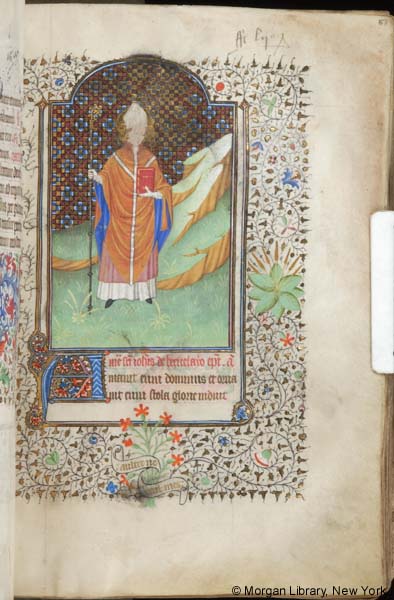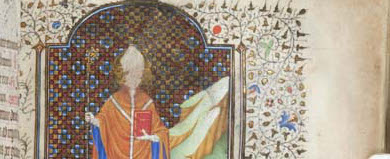Maybe it’s just me, but I’ve always wondered where the prayers in Books of Hours come from. When we talk about them in class, I deliberately sideline this question: who wrote them down first is less important than the way they moved fluidly through the devotional landscape, morphing from one book to the next in small or big ways (as Katie has been tracking of the Boniface indulgenced rubric for the Hargrett Hours prayer “Domine ihesu christi qui hanc sacratissimam carnem”). But these textual traditions had to start somewhere. At one point, some canon or priest or minor official in a bishop’s household had to put these devotional phrases into prayers so that those prayers could then go off into the scribal ether to be changed up in every imaginable way.
It’s difficult to track the origins of widespread prayers like “Domine ihesu christi,” because they are made up of commonplace phrases that often originated in the Bible. And the exercise doesn’t get us very far in understanding their import. (Some prayers are attributed to famous churchmen, like Bede or Bernard of Clairveaux, but these are almost certainly spurious attributions.) When we look at suffrages for saints, though — especially suffrages for less popular saints than John the Baptist, Christopher, or Katherine — the odds of success go up because there are fewer witnesses, so fewer opportunities for mouvance. And since suffrages sometimes include details about the saint’s life, we can at times identify when that detail derives from Text X and not Text Y.
Next week, I’m giving a paper at the International Medieval Congress in Leeds (Yorkshire) that treats in part this exact question. I’m talking about the way that St. John of Beverley, an early Anglo-Saxon bishop from Yorkshire, was venerated in southern England. Here’s the backstory. In 1515, Henry V and his English troops fought and won a crazy battle against the French at Agincourt. That battle occurred on 25 October, which is the feast day of Sts. Crispin and Crispian (as you might remember from Shakespeare’s Henry V). That day is also one of the feasts of John of Beverley, who had to date been commonly venerated in the north of England, but not so much in the south. But Archbishop Chichele decided that it’d be great if everyone in England celebrated 25 October, so that next year he declared that 25 October, as well as John’s main feast day of 7 May, ought to be honored across England. And they were – John of Beverley starts popping up all the time in southern English contexts after 1516.
One place where John appears prominently is in the Book of Hours commissioned by Sir William Porter, one of Henry V’s leading knights during his invasion of France in 1515. The Hours of William of Porter (New York, Pierpont Morgan Library MS M.105)* contains a crazy huge number of suffrages – sixty-one of them. Sixteen of those are for English saints, some of whom have no other suffrage that I’ve ever seen. John of Beverley is one of them.

Presumably, Porter went to the French bookmaker who designed his Book of Hours for him, and gave him a list of saints he wanted suffrages for. So what did that poor bookmaker do when he had to come up with a suffrage for English saints like John or Jambert**, whom he’d probably never heard of?
Apparently, my fictional bookmaker turned to the breviary. The breviary is the book that contains all the texts that monks and nuns would use in their daily round of services, including the special hymns and prayers for a specific saint that they’d say on her feast day. It turns out that Porter’s suffrage for John of Beverley comes straight out of the Breviary for the Use of York.***
[Antiphon] Amauit eum dominus et ornauit eum stola glorie induit eum et ad portas paradisi coronauit eum
[Versicle] Iustum deduxit dominus per uias rectas
[Response] Et ostendit illi regnum dei[Prayer] Deus qui presentem diem beati iohannis episcopi et confessoris migratione huius seculi consecrasti: da ecclesie tue digne de eius solennitatibus gaudere . ut apud tuam misericordiam exemplis eius adiuvemur et
meritas. Per xpistum dominum nostrum, Amen.
The opening antiphon, versicle, and response are verbatim from the York Vespers service for the Common for One Confessor,*4* and the prayer is a 99% match with the first prayer for John at Vespers on the night before his his feast day of 7 March.
Well. That was easier than I anticipated.
(Note also how William has his motto, “aultre ne vuel mes,” in a banderole in the bottom register of the border. William’s motto and arms are scattered liberally throughout this manuscript.)
It’s also not surprising, since such textually codified devotion to saints often originated in monastic contexts. After all, that’s how Books of Hours got their start – they’re a private monastic devotion that trickled down to the devout laity when they wanted to take their spiritual lives up a notch. And within a monastery or a cathedral setting, there would be a person (often the cantor or cantrix – think choir director) whose job it was to update the liturgy as needed.
I haven’t had a chance yet to check the other obscure saints’ suffrages in the William Porter Hours (or from the other English Books of Hours I’ve been looking at), but I anticipate they too will originate in the propers found in breviaries. Well, except for poor Jambert – he may have to be content with an off-the-rack prayer for a bishop.
*Thanks, Katie, for getting scans of the suffrage texts for me while you were at the Morgan this spring!
**Jambert or Jaenberht was an early Archbishop of Canterbury (765-92). I had never heard of him, and I’m pretty good with obscure English saints, so I can’t imagine my fictional Parisian bookmaker was on a first-name basis with him.
***The “standard” version of the services used in Yorkshire, which differs in minor ways from the standard version of services used in southern England, known as the Use of Sarum.
*4*Not every saint had special hymns and prayers, known as “propers”; the generic set of hymns and prayers was known a “common,” so the “common for one confessor” was the off-the-rack service you’d say for any male non-martyr saint who wasn’t fancy enough in your church to have his own bespoke service.
